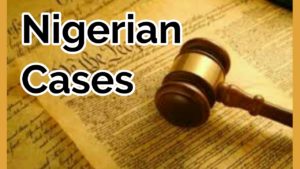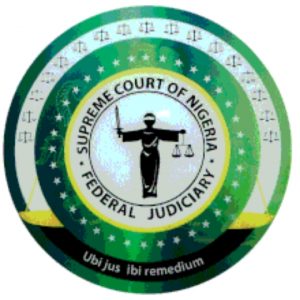Denloye V Medical And Dental Practitioners Disciplinary Committee (1968) LPELR – 22526 (SC): This case was about a medical practitioner who was tried by the Medical and Dental Practitioners Tribunal and had his name struck out of the Medical Practitioners Register, having not complied with the principles of fair hearing.
Recommended: Case summary of Bronik Motors Ltd & anor V Wema Bank Ltd
Facts of the Case of Denloye V Medical And Dental Practitioners Disciplinary Committee
Dr. Denloye who is a medical practitioner is the appellant in this suit. He brought this appeal against the decision of the tribunal, Medical and Dental Practitioners Disciplinary Tribunal. The decision of the tribunal found him guilty of professional misconduct on five count charges. The tribunal thereon ordered the appellant’s name to be struck out from the Register of Medical Practitioners.

The first count charge was on the ground that the appellant between 29th June and 10th July 1996 neglected his patient, Fatilatu Bisiriyu for a prolonged duration. The appellant was the doctor directly in charge of treating the patient under the Western Nigerian Ministry of Health.
The second count charge was on the ground that the appellant extorted the sum of 30 guineas from one Bisiriya Odumeru who happens to be the father of the appellant’s patient, Fatilatu Bisiriyu. The money was said to have been extorted by the appellant as an inducement for him to examine and treat the said patient.
The third count charge was on the ground that the appellant received the sum of 2 Euros 2s 0d. The fourth count was also on the ground of the receipt of the same amount on a different transaction for the same purpose, while the fifth count charge was on the ground of receipt of 2 Euros. The monies were received in order for the appellant to falsely certify another’s fitness for employment.
Also see: Differences between void and voidable contract
Issues raised in Denloye V Medical And Dental Practitioners Disciplinary Committee
a. The right to fair hearing and the power of a tribunal to constitute its own rules and procedures for a disciplinary enquiry
b. Whether the tribunal was the appropriate body to handle criminal charges
By the virtue of section 12 of the Medical and Dental Practitioners Act 1963, when a complaint is made against a medical practitioner for misconduct, the Medical and Dental Practitioners Investigation Panel shall first investigate the report in order to know whether there is a prima facie case for the respondent to answer before the tribunal.
It is after this stage has been ascertained that if the report shows a prima facie case, the matter is then taken to the tribunal. In the instant case, the investigating panel in the conduct of their investigations called witnesses from whom they received evidence. Neither the appellant nor any of his representatives was present. The panel did not get the appellant informed on the evidence received in respect of his matter.

Recommended: How to become a successful lawyer
Even when the chairman of the panel was asked to produce it, he refused and termed the evidence so obtained confidential and thus, only available for use by the panel. After the trial has commenced before the tribunal, and at a later time, the evidence was then availed to the appellant. The investigating panel went all the way from Lagos to Ikenne to obtain evidence in the complainant’s house, Mr. Tai Solarin, a practice which is unknown to the judicial system.
The complainant could have been invited to the panel instead and not otherwise. Several demands made by the appellant’s counsel for the panel to avail the evidence obtained against his client’s case were turned down. Evidence was also obtained from several other people against the appellant. Only the complainant, Mr. Tai Solarin was later brought before the tribunal for cross – examination.
Meanwhile, the appellant was first cross-examined even without being presented with the evidence obtained against him upon which he was cross-examined. Moreso, the complainant, Mr. Solarin was cross-examined before the tribunal and that was when the appellant and his counsel became aware of the nature of the evidence presented against him with respect to counts 3, 4, & 5.
Other witnesses were not called to be cross-examined. The counsel for the appellant based his contentions on the above irregularities pointed out. He contends that the appellant was not given a fair opportunity to know the nature of his case, and as such, it amounts to breach of the principles of natural justice.
Recommended: Mojekwu v Mojekwu: Facts, Issues and decision of the court
Judgment of Court in Denloye V Medical And Dental Practitioners Disciplinary Committee
The court stated that inasmuch as a tribunal has the autonomy to formulate rules and principles guiding the enforcement of discipline in a profession, it must be done with utmost compliance with the principles of natural justice. The observance of the rule of natural justice is dependent on the circumstance of each case, the subject matter, the rules guiding the tribunal, and the nature of the enquiry being made.

The court held that the appellant has the right to be accorded fair hearing. He was entitled to be abreast with the nature of the evidence being presented against him. Therefore, the tribunal was wrong to have withheld the evidence. The conduct of the tribunal with respect to the matter was held to amount to denial of justice. The appellant was not afforded a fair opportunity to defend the evidence presented against him.
Also see: Facts, Issues and decision in Ukeje v Ukeje
On the second issue, the issue raised by the Counsel was whether the tribunal is the appropriate body to conduct a criminal trial as were charged against the appellant. The Counsel contends that the appropriate authority to determine such criminal charges is the court. He relied on the provision of section 22(2) of the constitution which provides that a person charged with an offence shall be entitled to fair hearing by a court of competent jurisdiction within a reasonable time. The court however did not uphold this ground of appeal.
The court held that the count charge one does not have any criminal resemblance as contended by the appellant’s counsel. However, count two, three, four and five was held to be covered by the criminal code sections as was submitted by the appellant’s counsel.
The decision of the tribunal was set aside, including the order striking the name of the appellant off the Medical Register.

Edeh Samuel Chukwuemeka, ACMC, is a lawyer and a certified mediator/conciliator in Nigeria. He is also a developer with knowledge in various programming languages. Samuel is determined to leverage his skills in technology, SEO, and legal practice to revolutionize the legal profession worldwide by creating web and mobile applications that simplify legal research. Sam is also passionate about educating and providing valuable information to people.
Thank you for always helping me out in this law-student life.